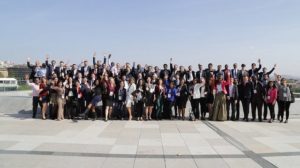Francisco Galtieri, Future Energy Leader Board member commented:
“In most cases, these programmes can be considered the national equivalent to the global FEL-100 programme. The structure and activities of the programme are tailored to the member committee’s national context. A total of 11 National FEL Programmes exist as of December, 2016.”
The Taskforce was pleased to share the final version of the National FEL Programme Guidance Document in early March. Eight countries with National FEL Programmes (Argentina, Austria, Germany, Hungary, New Zealand, Nigeria, Romania, and Zimbabwe) responded to an online survey as part of the report making process with South Africa also sharing information about the Young Energy Leaders Forum.
According to the survey, the three main common goals of creating a Future Energy Leaders programme at national level are:
-
Provide a platform for young and highly skilled individuals to discuss relevant energy issues.
-
Provide networking opportunities for these individuals in the sector.
-
Support the MCs activities
In addition to the diversity of backgrounds, diversity of gender is also important (about 40 % of the members are female, a higher proportion than the average in the energy industry). Participants are ambitious, dynamic and eager to learn. In 75% of the national programmes, members are from not only one single city but come from across the country.
To provide a platform for young professionals from the energy sector, the World Energy Council set up a network of exceptional individuals from across the globe. These individuals are called Future Energy Leaders (FEL-100) and represent the different players the energy sector is composed of. This includes government officials, industry experts, academicians, members of civil society and social entrepreneurs.
Through the FEL-100, participants can further develop their experience, knowledge and skills in an energy-focused environment and contribute to the Council’s global dialogue. The programme is designed to build on the ideas and innovative potential of the next generation, helping to develop new ways of thinking and framing the future of sustainable energy.






_-80_result_688_387_s_c1_c_c.jpg)


